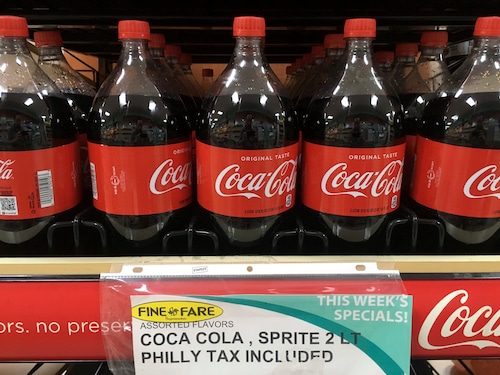The Philadelphia Inquirer (TNS) by Aubrey Whelan
The city of Philadelphia Christina Roberto, a researcher at the University of Pennsylvania, wasn’t sure she would uncover much of a health impact when she set out to investigate Philadelphia’s soda tax.
We are aware of how difficult it is to lose weight and maintain it off, so expecting a policy like this to have a positive impact on health is a very high bar, she said.
In fact, according to Roberto’s study, which was published this month in The Lancet, Philadelphia’s average BMI—a gauge of body fat based on height and weight—is still rising.
However, BMIs are increasing more slowly in Philadelphia than in control groups outside the city. According to the study’s authors, there is little proof that the city’s BMI and obesity prevalence dropped three years after the 2017 tax was put into place.
Regular consumption of sugar-filled beverages is linked to obesity, weight gain, and other illnesses like diabetes. The goal of Philadelphia’s soda tax, the first in a major American city, is to reduce sales by raising wholesalers’ prices for sodas, energy drinks, mixers, and other sugary drinks by 1.5 cents per ounce. Most of the time, consumers pay higher prices as a result of the increasing costs. Improvements to parks and community centers as well as pre-kindergarten education are largely funded by the tax, which goes to the city’s general fund.
According to the American Medical Association, a person’s body composition and form might differ based on their age, gender, and race, and BMI alone is frequently not a reliable indicator of that person’s health. When considering weight and body fat when deciding on a course of treatment, the American Medical Association advises practitioners to use BMI in conjunction with other metrics.
However, the American Medical Association and other experts believe that the BMI measurement is a more accurate data point for studying health across broad populations. When the American Medical Association advised physicians not to use BMI alone to evaluate a patient’s health last year, Iliya Gutin, a program officer at the National Academies of Sciences, Engineering, and Medicine at the time, told the New York Times that BMI is likely the best we can do.
Although the soda tax has little effect on Philadelphia’s average BMI, it is important to researchers. Giant reductions are not occurring. “What’s surprising is that we’re seeing reductions at all,” Roberto stated.
Increasing research on the soda tax s impact
In 2017, the American Beverage Association spent millions campaigning against Philadelphia’s contentious soda tax. Critics said that the levy would not meet its public health objectives and would negatively impact local companies and consumers.
However, the clamor subsided over time as the beverage sector concentrated on blocking the imposition of such levies in other places, and scientific studies are now starting to look at the tax’s effects.
Among communities that implemented comparable taxes, Philadelphia experienced some of the largest drops in sales of sugary drinks, according to a different study that was published earlier this year in JAMA Health Forum. In the years after the implementation of the tax, sales here fell by almost half.
Roberto’s study compared Penn patients from Philadelphia with those from the city’s collar counties in Pennsylvania and New Jersey, where beverage taxes were not in place, using electronic health records from Penn Medicine.
Roberto stated that more research is required to determine the health effects of beverage taxes, but she has been heartened by studies that have demonstrated comparable advantages in other nations and towns that have imposed taxes.
It’s difficult to be certain that you have the final answer after just one study, she remarked. However, I’m beginning to believe that taxes might be doing more to improve health.
A clear no-brainer
According to Roberto, even modest increases in BMI or a simple drop in soda sales and consumption demonstrate the effectiveness of the tax.
This is a policy that seems obvious to me. “We tax other things, like tobacco, that we know are bad for our health, and we know from a lot of data that sugary drinks are bad for our health,” she said. Reducing consumption of sugar-filled beverages is beneficial, even if there is no BMI effect.
Additionally, Roberto pointed out that since the tax supports pre-K programs and quality education is another strong indicator of general health, it may also have additional effects on public health.
Roberto expressed her hope that other communities thinking about enacting a beverage tax will be influenced by the Philadelphia findings.
The more information we gather, the more Philly may be used as an example. According to her, you could persuade more states and localities to follow suit, which could enhance the general health of Americans.
Note: Every piece of content is rigorously reviewed by our team of experienced writers and editors to ensure its accuracy. Our writers use credible sources and adhere to strict fact-checking protocols to verify all claims and data before publication. If an error is identified, we promptly correct it and strive for transparency in all updates, feel free to reach out to us via email. We appreciate your trust and support!

